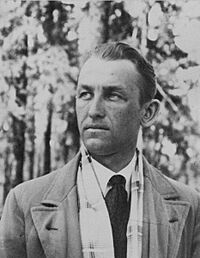Bernard Kangro facts for kids
Quick facts for kids
Bernard Kangro
|
|
|---|---|
 |
|
| Born | 18 September 1910 Oe, Võru County, Governorate of Livonia, Russian Empire
|
| Died | 25 March 1994 (aged 83) |
| Other names | Antsla Pännu Herbert Viipilt Joonas Taavet Josef Tsaxtinis Kroonik Oskar Jooniste Taavet Valler |
| Occupation | Writer, poet |
| Years active | 1935–1994 |
Bernard Kangro (born September 18, 1910 – died March 25, 1994) was a famous Estonian writer and poet. He wrote many books and poems. He is known for his beautiful language. He also had to leave his home country during a difficult time. He continued to write and share Estonian culture from far away.
Contents
Early Life and Learning
Bernard Kangro grew up in a farming family. His parents were Andres and Minna Kangro. He went to primary school in Kiltre from 1919 to 1922. After that, he attended a school in Antsla until 1924. From 1924 to 1929, he studied at a high school in Valga.
He then went to the University of Tartu. There, he studied Estonian language and literature. He was a university student from 1929 to 1938.
A Life of Writing
Bernard Kangro started his writing career in 1935. His first book was a collection of poems called Sonetid. He wrote many more poetry books after that.
In 1938, Kangro joined a group of artists called Arbujad. This group wanted to explore deeper feelings and spiritual ideas through language. He also worked as a journalist. He wrote for Eesti Sona in 1942 and Puhkus ja elurõõm in 1943.
From 1943 to 1944, he worked at the Vanemuine theater in Tartu. He was a dramatist, which means he helped create plays. He also taught literature at the University of Tartu from 1942 to 1944.
Life in Exile
In 1944, a big change happened in Estonia. The Soviet Union took control. Because of this, Bernard Kangro had to leave his home country. He moved to Sweden to live in exile.
In Sweden, he became one of the most important Estonian writers and journalists living outside Estonia. He first worked as an archivist in Karlstad. Later, in 1947, he became a research assistant at the University of Lund.
From 1950 until he passed away, he was the editor and publisher of Tulimuld. This was an important Estonian cultural magazine. He also directed the Eesti Kirjanike Kooperatiiv (Estonian Writers' Cooperative) starting in 1951.
Bernard Kangro wrote many novels and poetry books. His stories often focused on country life in South Estonia and the city of Tartu. His poems used creative and symbolic language. They showed different feelings like humor, joy, and sometimes sadness.
His Books and Poems
Bernard Kangro created a large collection of works during his lifetime.
Collections of Poetry
- "Sonetid" (1935)
- "Vanad majad" (1937)
- "Reheahi" (1939)
- "Põlenud puu" (1945)
- "Pühapäev" (1946)
- "Seitsmes öö" (1947)
- "Tulease" (1949)
- "Veebruar" (1951)
- "Eikellegi maa" (1952)
- "Suvihari" (1955)
- "September" (1964)
- "Varjumaa" (1966)
- "Allikad silla juures" (1972)
- "Hingetuisk. Jääminek" (1988)
Anthologies
- "Ajatu mälestus" (1960)
- "Minu nägu" (1970)
- "Kogutud luuletused" (1991)
- "Kojukutsuv hääl" (2000)
Novels
- "Igatsetud maa" (1949)
- "Kuma taevarannal" (1950)
- "Peipsi" (1954)
- "Taeva võtmed" (1956)
- "Sinine värav" (1957)
- "Jäälätted" (1957)
- "Emajõgi (1961)
- "Tartu (1962)
- "Kivisild (1963)
- "Must raamat (1965)
- "Keeristuli" (1969)
- "Joonatan, kadunud veli" (1971)
- "Öö astmes x" (1973)
- "Puu saarel on alles" (1973)
- "Kuus päeva" (1980)
- "Seitsmes päev" (1984)
Essays and Memories
- "Arbujad" (1981)
- "Kipitai" (1992)
- "Härjanädalate aegu" (1994)
- "Üks sündmusteta suvi" (1998)

